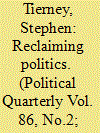| Srl | Item |
| 1 |
ID:
167464


|
|
|
|
|
| Summary/Abstract |
The recent Indonesian elections signalled relative stability in spite of the rise of contentious politics. To explain this, the article first discusses the way the incumbent Joko “Jokowi” Widodo’s administration has handled the rise of Muslim populism sponsored by his political opponents. This has included a reliance on illiberal measures, the political adjustment and “triangulation” of his policies, and a revival of Indonesia’s socio-religious and ethnic politics. Second, the article provides a longer historical perspective to show how the failure to restore the liberal parliamentary politics of the 1950s, and the inability to sustain the popular reforms of the mid-2000s that brought Jokowi to power, constitute more fundamental explanations both for the undermining of Indonesia’s democracy and for the provisional political stability.
|
|
|
|
|
|
|
|
|
|
|
|
|
|
|
|
| 2 |
ID:
101802


|
|
|
| 3 |
ID:
138879


|
|
|
|
|
| Summary/Abstract |
Referendums are often criticised for being elite-controlled and undeliberative. This article argues that the detailed, multiactor regulation of the Scottish referendum resulted in an elaborate legal regime which helped to overcome these potential pathologies, diluting executive control and facilitating an exercise in national public engagement. It addresses the troubled history of referendum use in the UK and contends that the Scottish process may well transform how referendums are now viewed. Indeed, one outcome of the Scottish process is likely to be a greater demand at UK level for the use of direct democracy in processes of significant constitutional change. It is by no means certain, however, that these demands for greater popular engagement in the process of constitutional change will be met, particularly when we consider the Smith Commission process, which marks a return to elite interparty bargaining.
|
|
|
|
|
|
|
|
|
|
|
|
|
|
|
|